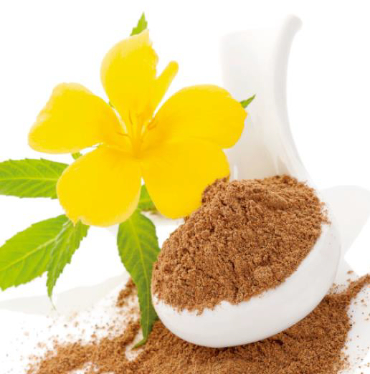

Liboost® - consumers suggest they want it
A consumer study found that:
- 83% of participants (including men and women) would buy Liboost® after trying it for 4 weeks.
- 85% of participants (including men and women) would recommend the Liboost®.
- 66% of participants considered that 1 month of treatment was correct.
- 80% of participants considered that dosage and appearance was correct.
Bioactives
Liboost® is standardized to ≥ 1.5 total bioflavonoids by HPLC and to the following biomolecules, which have been related to
sexual appetite boost properties:
• ≥ 0.15 mg/g luteolin 7 o glucoside
• ≥ 0.25 mg/g apigenin 7 o glucoside
• ≥ 0.15 mg/g acacetin
Damiana extracts are among the most adulterated ingredients, typically enriched with other extracts.
Liboost ® standardization to a pool of flavonoids by the highly reliable technique of HPLC, ensures the extract´s homogeneity and prevents adulteration.
Disclaimer
These is a summary of published research but has not been evaluated by the European Food Safety Authority (EFSA) or other pertinent Regulatory Authority. This product is not intended to diagnose, treat, cure or prevent any disease.
Traditional Use and History
The use of Damiana dates back many centuries. There are reports of its use by the Maya civilization as an aphrodisiac, as well as to treat dizziness and loss of balance. It was also used by the Aztecs as a tonic that was believed to improve overall health and wellbeing.
Then when the Spanish missionaries arrived in Mexico, they started to export Damiana and in the 1870s Damiana began to spread as a commercial product. Later, in the USA, it was sold as an ingredient for tonics, elixirs and tinctures. At that time, it was predominantly being used as an aphrodisiac.
Knowledge about Damiana was gradually lost, until it was rediscovered in the 1960s by ethnobotanists and hippies. Damiana has since then had a permanent place in the medicine cabinets of herbalists and phytotherapists.
“43% of women worldwide suffer from sexual dysfunction. Approximately 20% of sexual dysfunction in men is due to psychological factors and 15% of men worldwide suffer from erectile dysfunction"
Ahmed A., et al. EMHJ. 2011; Vol.17 No. 7; Webmd.com; Rosen R.C.Rosen R.C. Current Psych Rep 2000; 2:189 195.

Main Mechanism in Men
- Nitric Oxide (NO) release - The mechanism of action involves several molecular pathways participating in NO release and libido arousal.
- PDE 5 activity inhibition - which induces smooth muscle relaxation, resulting in erection.
- Increases testosterone levels - inhibits testosterone degradation due to its anti-aromatase activity.
Main Mechanism in Women
- Nitric Oxide (NO) release - increase the release of NO, promoting normal behaviour of the first stage of female sexual function to further promote normal sexual activity.
- PDE 5 activity inhibition - induces smooth muscle relaxation, resulting in vaginal smooth muscle relaxation.
- Increases testosterone levels - inhibits testosterone degradation due to its anti-aromatase activity.


